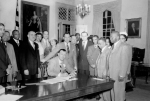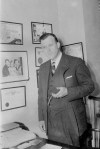Governor Theodore McKeldin (1900–1974), Marse Callaway, and Carl Murphy (1889–1967) were immensely important in the struggle for civil rights. After his first of two terms as Mayor of Baltimore, Republican Gov. McKeldin took office in 1951 until 1959. Promoting racial justice early in his political career, he gained powerful allies in the black community. Callaway served as McKeldin’s political aide, bridging the issues of the black community to Gov. McKeldin. Murphy, editor-publisher of the Afro-American newspaper, helped shape the movement by choosing its leaders, providing funding, and reporting issues to his readers. Image: Governor Theodore McKeldin in his office with Marse Callaway and Carl Murphy in background, Annapolis, 1951, Maryland Historical Society, HEN.00.B1-069
PHOTOGRAPHS AND AUDIO CLIP: Silas Craft, educator and school administrator involved with the Civil Rights movement through the NAACP of Howard and Montgomery Counties, speaks about Governor Theodore McKeldin. (McKeldin-Jackson Oral History Project, Maryland Historical Society, OH 8137.)
Transcript:
Oh yes, always impressed with him [inaudible] He attempted to follow various kinds of suggestions as far as I could see, he did a pretty good job at keeping his formal commitments. What else… he annunciated.
As far as I know, I wasn’t on the political circles, political circuit. Still not. But my general observation he was pretty pronounced in his behavior. And he did break barriers in the appointing of blacks to certain administrative posts that never held before in the history of America.
But the state as a whole, from McKeldin [inaudible] governors had a way of shying away from the basic concerns of the black movement and civil rights. Governor after governor did not let themselves become too involved in those areas. Other than to provide some good service.
I would say McKeldin was the forerunner of new thought in this area of race relations from the time I came to this state, to the time that he ended his administration.
Certainly think he did a good job of breaking all… making the trail for change. Of course we know we could go back to when it got rid of the whole Jim Crow law here in the state… came right up to the apartments of blacks to administrative boards in the state [inaudible].


















